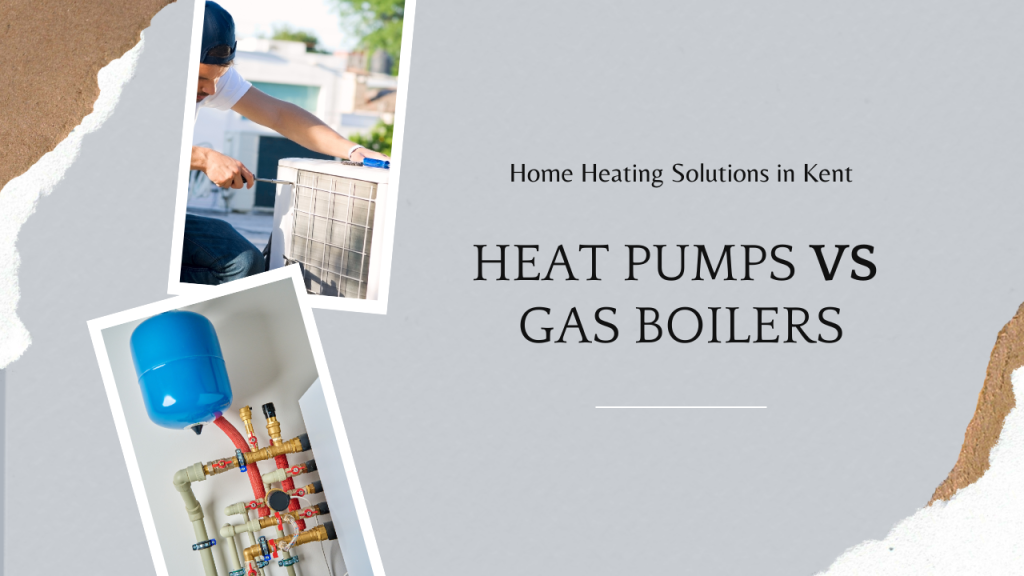Introduction: The Shift Towards Low-Carbon Heating
A rising common question in the plumbing and heating sector is heat pumps vs gas boilers. Home heating accounts for approximately 14% of the UK’s carbon emissions, putting gas boilers at the center of environmental concerns. As the UK government pushes toward carbon neutrality by 2050, low-carbon alternatives such as heat pumps are being promoted as a solution to reduce household emissions. But how do they compare to gas boilers in terms of efficiency, costs, and long-term benefits?
In this guide, we’ll provide a detailed comparison of heat pumps vs gas boilers to help you decide which heating system is the right choice for your home.
How Do Heat Pumps and Gas Boilers Work?
🔥 Gas Boilers: Traditional Heating
A gas boiler burns natural gas to produce heat, which is then transferred to radiators and hot water systems. Modern condensing boilers are designed to capture and reuse heat that would otherwise be lost, making them up to 90% efficient.
🌿 Heat Pumps: A Renewable Alternative
A heat pump extracts energy from the air or ground and amplifies it using electricity. Unlike gas boilers, heat pumps do not generate heat; they transfer existing heat, making them far more energy-efficient.
✅ Types of Heat Pumps:
- Air Source Heat Pumps (ASHPs) – Extract heat from the air and work with radiators, underfloor heating, and hot water.
- Ground Source Heat Pumps (GSHPs) – Use underground heat, offering even greater efficiency but requiring more installation space.
- Hybrid Heat Pumps – Combine a heat pump with a high-efficiency gas boiler for additional heating support when required.
Installation Complexity & Costs
Gas Boiler Installation 🔧
✅ Quick and simple – Usually completed within one day. ✅ Lower upfront cost – New gas boiler installations typically range from £1,700 – £3,500. ✅ Widespread availability – Many Gas Safe engineers are available for installation and servicing.
Heat Pump Installation ⚡
❌ More complex installation – Takes 2–3 days for air source heat pumps and several weeks for ground source heat pumps. ❌ Higher upfront cost – Prices range from £10,000 – £22,000 for air source heat pumps and £18,000 – £25,000 for ground source heat pumps. ✅ Eligible for £7,500 Boiler Upgrade Scheme grant – This reduces upfront costs and makes heat pumps more competitive.
Conclusion: If speed and affordability are your priority, a gas boiler is the better option. However, with government grants, a heat pump can be a viable long-term investment.
Running Costs: Gas vs Electricity
Gas Boiler Running Costs 🔥
Gas remains cheaper than electricity in the UK, with average prices at 5.48p per kWh, making gas boilers affordable to run.
Heat Pump Running Costs ⚡
Although electricity costs more (22.36p per kWh), heat pumps are significantly more efficient, with an average efficiency rating of 300-400%. This means that for every 1kWh of electricity used, a heat pump generates 3-4kWh of heat.
Conclusion: Heat pumps are cheaper to run in a well-insulated home, but for poorly insulated properties, gas boilers remain more cost-effective.
Efficiency: Which System Performs Better?

Gas Boiler Efficiency 🔥
- Modern condensing boilers are up to 90% efficient.
- Some heat is still lost through the flue pipe.
Heat Pump Efficiency ⚡
- Air source heat pumps achieve 300% efficiency (COP 3.0).
- Ground source heat pumps can exceed 400% efficiency (COP 4.0).
- Heat pumps work best when paired with underfloor heating or larger radiators.
Conclusion: Heat pumps outperform gas boilers in efficiency, but require a thermally efficient home to see cost benefits.
Carbon Footprint: Which is Greener?
Gas Boilers and Emissions 🔥
- A gas boiler emits 215g CO₂ per kWh.
- While modern condensing boilers are more efficient, they still burn fossil fuels.
Heat Pumps and Sustainability ⚡
- Zero on-site carbon emissions.
- Uses renewable energy sources, making it the most environmentally friendly choice.
- Efficiency improves when paired with solar PV panels.
Conclusion: If reducing carbon emissions is your priority, heat pumps are the clear winner.
Space Requirements: Where Can They Be Installed?
Gas Boilers 🔥
✅ Compact and easy to install indoors (kitchen, airing cupboard, or loft).
Heat Pumps ⚡
❌ Requires outdoor space for the unit. ❌ Ground source heat pumps need extensive digging for pipework.
Conclusion: If you have limited outdoor space, a gas boiler may be the better choice.
Government Grants and Future Regulations
Gas Boiler Regulations 🔥
- Gas boilers banned in new builds from 2025.
- A full ban on new gas boiler installations expected by 2035.
Heat Pump Grants and Incentives ⚡
- Eligible for the £7,500 Boiler Upgrade Scheme grant.
- Expected to become cheaper as adoption increases.
Conclusion: Heat pumps will likely become the dominant heating solution, but gas boilers remain viable for now.
Heat Pumps vs Gas Boilers: Which Should You Choose?
| Factor | Gas Boiler | Heat Pump |
|---|---|---|
| Upfront Cost | Lower (£1,700 – £3,500) | Higher (£10,000 – £22,000) |
| Running Cost | Cheaper with current gas prices | More efficient but relies on electricity |
| Efficiency | ~90% | 300–400% |
| Carbon Footprint | High CO₂ emissions | Low to zero emissions |
| Installation | Quick (1 day) | Longer (2-3 days for ASHP, weeks for GSHP) |
| Space Requirements | Compact, fits indoors | Requires outdoor space |
| Government Support | None currently | £7,500 grant available |
Conclusion: Making the Right Choice for Your Home
Choosing between heat pumps vs gas boilers depends on your budget, home insulation, and long-term energy goals.
🔹 Choose a gas boiler if: You need a quick, cost-effective heating solution with low upfront costs.
🌿 Choose a heat pump if: You want a long-term, eco-friendly investment that reduces carbon emissions and running costs over time.
📞 Want to find out more? Looking to switch to a heat pump or upgrade your heating system? Request an estimate from Transcrew Heating & Cooling Technologies today!


No responses yet